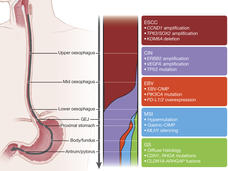Cancer Currents: An NCI Cancer Research Blog
A blog featuring news and research updates from the National Cancer Institute.
-
Genome Study Points to New Subtypes of Esophageal Cancer
A new study by The Cancer Genome Atlas Research Network could help classify esophageal cancers according to their genetic and molecular alterations and identify potential new treatment options.
-
Shifts Seen in Tobacco Product Types Purchased in US
The consumption of cigarettes, small cigars, and chewing tobacco has declined over the past 15 years, according to a new study. These declines were partially offset by a rise in consumption of large cigars, pipe tobacco, and snuff.
-
The Global Economic Burden of Tobacco: An Interview with Dr. Mark Parascandola
NCI’s Dr. Mark Parascandola answers questions about The Economics of Tobacco and Tobacco Control, the latest in a series of monographs on tobacco use and tobacco control, which was co-written with the World Health Organization.
-
Ibrutinib Relieves Chronic Graft-Versus-Host Disease Symptoms
The targeted cancer therapy ibrutinib can effectively treat the symptoms of chronic graft-versus-host disease, a common and serious complication of allogeneic stem cell transplants, findings from a small clinical trial show.
-
FDA Approves Rucaparib for BRCA-Positive Ovarian Cancer
The FDA has approved rucaparib for women with BRCA-positive advanced ovarian cancer based on findings from two small clinical trials showing that it shrank tumors.
-
For Some Breast Cancer Survivors, Drug May Reduce Treatment-Related Joint Pain
Researchers have found that duloxetine (Cymbalta®), a drug most commonly used to treat depression, may also reduce joint pain caused by aromatase inhibitors in some women being treated for early-stage breast cancer.
-
New Mouse Model Closely Mimics Most Common Leukemia in Infants
Researchers have created a long-sought-after mouse model for an aggressive form of acute lymphoblastic leukemia that occurs commonly in infants and that the researchers believe can accelerate the development of new therapies for the disease.
-
New Targeted Therapies Show Promise for Treating Advanced GIST
Two new targeted therapies have shown promise in patients with gastrointestinal stromal tumors (GIST) that have developed resistance to standard therapies.
-
Brain Cancer’s Cholesterol Addiction May Offer New Treatment Strategy
Brain cancer cells are heavily dependent on a constant supply of cholesterol to survive, a new study suggests. And in mice with brain tumors, treatment with a cholesterol-depleting drug slowed tumor growth and improved survival.
-
Single Tumor Cells Reveal Clues to Biology of Multiple Myeloma
A study suggests that individual tumor cells circulating in the blood of patients with multiple myeloma may be a new source of information about the genetic changes driving the disease.
-
FDA Approves New Use for Daratumumab in Multiple Myeloma
The FDA has approved daratumumab, in combination with either of two other standard therapies, in patients with multiple myeloma whose disease has progressed after only a single prior treatment course.
-
Immune-Cell Traps May Aid Cancer Metastasis
Cancer cells may exploit a normal function of neutrophils, the most common form of white blood cell, to help form metastatic tumors, a new study suggests.
-
FDA Approves Nivolumab for Head and Neck Cancer
The FDA has approved nivolumab for squamous cell carcinoma of the head and neck that has progressed during chemotherapy with a platinum-based drug or that has recurred or metastasized after platinum-based chemotherapy.
-
Prescription Subsidies Reduce Breast Cancer Treatment Disparities
A new study has found that subsidies for prescription drugs can improve the use of adjuvant therapy in women with early-stage breast cancer and help reduce disparities in the use of these proven treatments among black and Hispanic women.
-
Device Uses Cancer Cells' Mass to Predict Response to Treatment
Scientists have designed a device that measures the mass of single cancer cells to predict how cells respond to drug treatment. The technology could potentially help clinicians determine whether a drug effectively kills cancer cells.
-
NCI’s Office of Cancer Survivorship: Celebrating 20 Years, Planning for Continued Progress
Dr. Julia Rowland, director of NCI’s Office of Cancer Survivorship, on the office’s 20th anniversary and efforts to ensure continued progress in survivorship research and improve survivors’ lives.
-
More Immunotherapy Options Approved for Lung Cancer
The FDA has approved atezolizumab and expanded the approval of pembrolizumab for some patients with non-small cell lung cancer.
-
Connected Health: An Important Tool for Making Progress against Cancer
A new report from the President’s Cancer Panel outlines how connective technologies can promote cancer prevention, enhance patients’ treatment experience, and accelerate progress in cancer research.
-
CDC Updates Recommendations on HPV Vaccine
Updated CDC recommendations advise those younger than age 15 need only two doses of the HPV vaccine instead of three.
-
Symposium Brings Rising Global Cancer Burden into Focus
An NCI Cancer Currents blog post about the NCI Global Cancer Research Symposium, which examined ways of increasing research collaboration, particularly in cancer prevention and screening, to reduce the cancer burden.



















